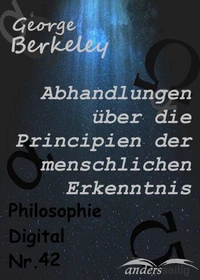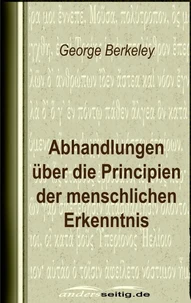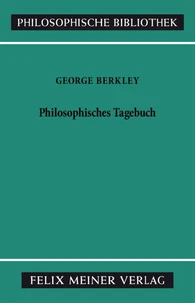An Essay Towards a New Theory of Vision. Challenging Perspectives on Visual Perception and Reality
Par :Formats :
Disponible dans votre compte client Decitre ou Furet du Nord dès validation de votre commande. Le format ePub est :
- Compatible avec une lecture sur My Vivlio (smartphone, tablette, ordinateur)
- Compatible avec une lecture sur liseuses Vivlio
- Pour les liseuses autres que Vivlio, vous devez utiliser le logiciel Adobe Digital Edition. Non compatible avec la lecture sur les liseuses Kindle, Remarkable et Sony
 , qui est-ce ?
, qui est-ce ?Notre partenaire de plateforme de lecture numérique où vous retrouverez l'ensemble de vos ebooks gratuitement
Pour en savoir plus sur nos ebooks, consultez notre aide en ligne ici
- Nombre de pages70
- FormatePub
- ISBN4057664607003
- EAN4057664607003
- Date de parution19/05/2021
- Protection num.Digital Watermarking
- Taille515 Ko
- Infos supplémentairesepub
- ÉditeurGOOD PRESS
Résumé
In "An Essay Towards a New Theory of Vision, " George Berkeley delves into the intricate relationship between perception and reality, challenging established notions of vision and its dependence on physical objects. Employing a combination of empirical observation and philosophical argumentation, Berkeley articulates his innovative theory that our understanding of distance, size, and shape is fundamentally shaped by visual experience rather than a direct correspondence to external forms.
This work is notable for its clarity and precision, employing a form of writing that balances rigorous analysis with accessibility, situating Berkeley within the broader context of early modern philosophy, particularly in relation to empiricism and metaphysics. George Berkeley, an Irish philosopher and bishop, was a pioneering figure in the development of idealism and is often linked to the early stages of modern philosophy.
His interest in the nature of perception can be traced back to a lifelong engagement with questions regarding reality and its representation. Throughout his career, Berkeley remained steadfast in his belief that vision is a constructive process, influenced by the observer's experience rather than mere sensory input, illuminating the philosophical debates of his time regarding the existence of the material world.
Readers interested in the intersection of philosophy and perception will find Berkeley's work both thought-provoking and essential. This essay invites readers to reconsider their understanding of sight and reality, ultimately encouraging a deeper inquiry into the nature of human experience. Berkeley'Äôs arguments resonate with contemporary discussions in philosophy and cognitive science, making this book a timeless resource for anyone seeking to explore the complexities of vision.
This work is notable for its clarity and precision, employing a form of writing that balances rigorous analysis with accessibility, situating Berkeley within the broader context of early modern philosophy, particularly in relation to empiricism and metaphysics. George Berkeley, an Irish philosopher and bishop, was a pioneering figure in the development of idealism and is often linked to the early stages of modern philosophy.
His interest in the nature of perception can be traced back to a lifelong engagement with questions regarding reality and its representation. Throughout his career, Berkeley remained steadfast in his belief that vision is a constructive process, influenced by the observer's experience rather than mere sensory input, illuminating the philosophical debates of his time regarding the existence of the material world.
Readers interested in the intersection of philosophy and perception will find Berkeley's work both thought-provoking and essential. This essay invites readers to reconsider their understanding of sight and reality, ultimately encouraging a deeper inquiry into the nature of human experience. Berkeley'Äôs arguments resonate with contemporary discussions in philosophy and cognitive science, making this book a timeless resource for anyone seeking to explore the complexities of vision.
In "An Essay Towards a New Theory of Vision, " George Berkeley delves into the intricate relationship between perception and reality, challenging established notions of vision and its dependence on physical objects. Employing a combination of empirical observation and philosophical argumentation, Berkeley articulates his innovative theory that our understanding of distance, size, and shape is fundamentally shaped by visual experience rather than a direct correspondence to external forms.
This work is notable for its clarity and precision, employing a form of writing that balances rigorous analysis with accessibility, situating Berkeley within the broader context of early modern philosophy, particularly in relation to empiricism and metaphysics. George Berkeley, an Irish philosopher and bishop, was a pioneering figure in the development of idealism and is often linked to the early stages of modern philosophy.
His interest in the nature of perception can be traced back to a lifelong engagement with questions regarding reality and its representation. Throughout his career, Berkeley remained steadfast in his belief that vision is a constructive process, influenced by the observer's experience rather than mere sensory input, illuminating the philosophical debates of his time regarding the existence of the material world.
Readers interested in the intersection of philosophy and perception will find Berkeley's work both thought-provoking and essential. This essay invites readers to reconsider their understanding of sight and reality, ultimately encouraging a deeper inquiry into the nature of human experience. Berkeley'Äôs arguments resonate with contemporary discussions in philosophy and cognitive science, making this book a timeless resource for anyone seeking to explore the complexities of vision.
This work is notable for its clarity and precision, employing a form of writing that balances rigorous analysis with accessibility, situating Berkeley within the broader context of early modern philosophy, particularly in relation to empiricism and metaphysics. George Berkeley, an Irish philosopher and bishop, was a pioneering figure in the development of idealism and is often linked to the early stages of modern philosophy.
His interest in the nature of perception can be traced back to a lifelong engagement with questions regarding reality and its representation. Throughout his career, Berkeley remained steadfast in his belief that vision is a constructive process, influenced by the observer's experience rather than mere sensory input, illuminating the philosophical debates of his time regarding the existence of the material world.
Readers interested in the intersection of philosophy and perception will find Berkeley's work both thought-provoking and essential. This essay invites readers to reconsider their understanding of sight and reality, ultimately encouraging a deeper inquiry into the nature of human experience. Berkeley'Äôs arguments resonate with contemporary discussions in philosophy and cognitive science, making this book a timeless resource for anyone seeking to explore the complexities of vision.











